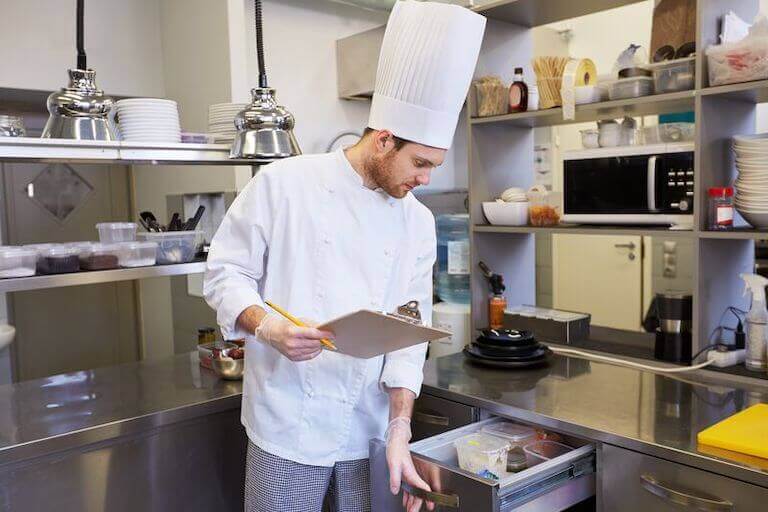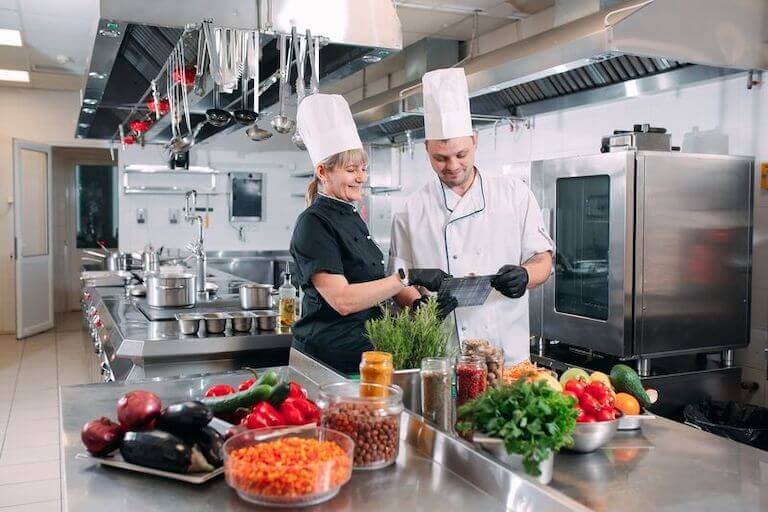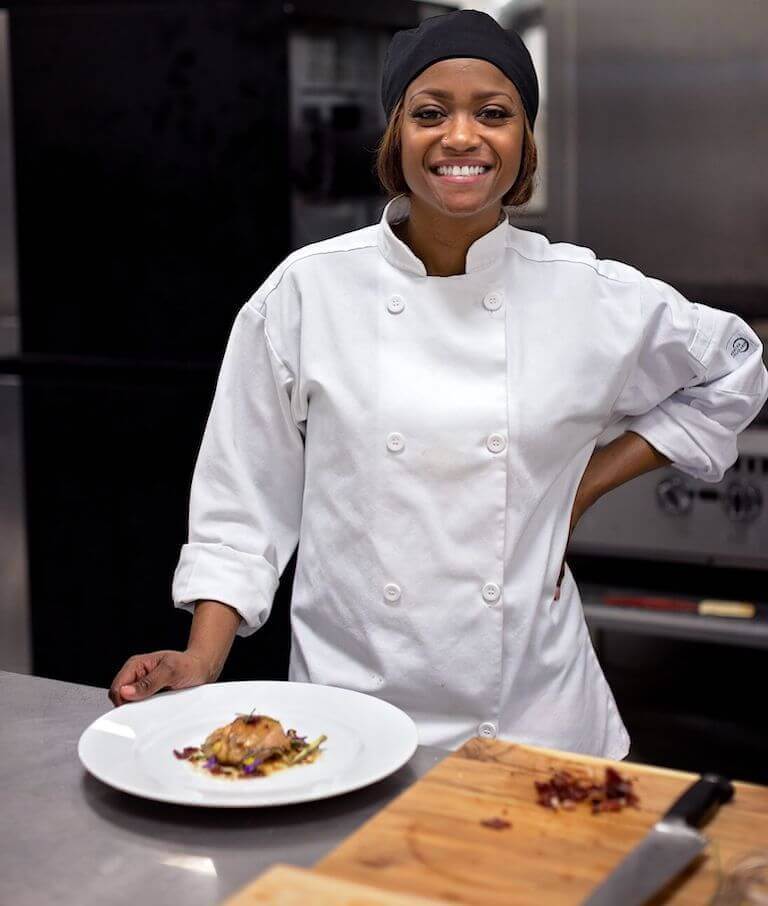Culinary careers can be highly competitive, and the job outlook is strong—the U.S. Bureau of Labor Statistics projected that employment for chefs and head cooks, for example, would grow at a rate of 15 percent from 2021-2030, much faster than average for all occupations.
According to the National Association of Colleges and Employers, “when choosing between two otherwise equally qualified candidates, employers deem having an internship with its organization or within its industry to be the most influential factor.” This means that a culinary internship or externship could give you an edge over other applicants and open the door to a new and exciting career in the culinary industry. So choosing the right one can potentially influence your career trajectory.
While both internships and externships can allow students to practice important culinary skills and get comfortable in a professional kitchen, they differ in a few key ways.
A culinary internship typically lasts longer than an externship, usually three to four months, and includes a general range of tasks. A culinary internship can occur at any point in a student’s curriculum.
Externships, on the other hand, are shorter in length and skill-set-specific, like a placement with a hotel. These short-term work opportunities can allow students to build skills they may need for their desired career and focus on the type of cooking they’d like to do after graduating. Students at Auguste Escoffier School of Culinary Arts must complete an approved industry externship as the final component of their curriculum before they graduate.
Read on to find out more about what you do during internships and externships and how to land them.
What Do You Do During a Culinary Externship?
A culinary externship can give you the chance to test your new knowledge in a working kitchen–whether that’s in a restaurant, hotel, resort, convention center, or even cruise ship. These placements are real-world experiences in an operational restaurant or related business, and can help build on the skills and techniques covered in courses.
Externships might be paid positions and may lead to permanent employment in the industry. For some students, their existing jobs may already qualify as externships.
Culinary externships are a great way to explore different interests. They can help students visualize what they may want to do and try on many different hats until they find a good fit. Externships can potentially translate to better job prospects, too. Restaurants tend to fill positions with experienced candidates who may require less training.
The duties performed by students during their externships may differ widely among different food establishments. Students could perform a variety of prep tasks, or they could be on the line, turning out finished dishes for paying guests.
For their externships, students might stay local, or they might travel. Student Oscar Beltran left Boulder, Colorado, for a fine dining restaurant in Cancun, Mexico.*
Externs may also see how the kitchen brigade system, aka the brigade de cuisine system—which chef Auguste Escoffier himself helped develop—works in action. And they can gain valuable insight into the career they may want to pursue after they complete their programs.
6 Tips to Landing a Culinary Internship or Externship
Although students are responsible for securing their own approved externships, Escoffier’s Career Services staff can help coach them through the process.
Escoffier partners with national and international businesses, connecting them with trained staff and externs. The school has a wide range of employer partners that may be a good fit. And Career Services representatives may also have connections with restaurants or food establishments that are local to students.
If you’re in the position of searching for such a role, here are some ideas for landing a culinary externship that may resonate with your career goals.

Culinary externships can give students the chance to get hands-on experience in professional kitchens.
1. Choose a Sector
Maybe you know what you want to pursue, or maybe you want to take a test ride. Start by choosing a sector of the industry you’re interested in, and be clear on your goals for the externship. What do you want to say about it when it’s over?
Consider cuisine, restaurant style, location, and potential for advancement. Once you have an idea of a segment you might like, look for employers in your local area that you could consider for an externship.
2. Polish Your Resume and Culinary Portfolio
Applying for an externship is like applying for a job, so make sure you’ve got your information and experience gathered together. Update your resume with any relevant experience and training. Ditto for your culinary portfolio, if you have one. If not, consider creating one!
While your resume includes a summary of your education and experience, a culinary portfolio is more extensive and creative and includes recipes, sample menus, and plenty of photos. When applying for externships, also be sure to have a cover letter template ready, and tweak it according to the position you apply for. Your aim is efficiency (having a template on hand) combined with personalization (wording specific to the position and person/people).
Student Chris Marhevka already had an extensive resume when he decided to make a big career change and attend culinary school. Chris had a Master’s Degree and worked as a social worker and mental health therapist, but he wanted to try something different. Culinary school and his externship paved the way.*
With the help of the Career Services department and General Education Department Chair, Chef Susan Yurish, Chris found an externship at La Marmotte in Telluride.*
“That wouldn’t have even been a possibility for me if it had not been for the Chef Instructors and the support staff at Escoffier,”* he said.

Culinary externships are short-term work opportunities that can let students expand upon their existing skills or develop new ones.
3. Utilize Your Networks
Networking is a key piece of the puzzle. Students at Escoffier have an abundance of great resources, which includes the people. Looking for help or just need ideas? Talk to Chef Instructors, fellow students, and alumni as well as people out in the field.
If you aren’t sure where to complete an externship, your mentors and Chef Instructors may be able to provide guidance. They might have a good understanding of where you excel and what you still need to practice, as well as which skills restaurants and employers might be looking for in culinary school graduates.
Networking is a good way to learn more about the possibilities that exist as well as to make potentially valuable contacts.
Student Merisauh Gamble successfully incorporated networking before and throughout her time at culinary school. She applied because she had a friend who attended Escoffier, went to the Austin campus early to ask about securing employment to pay for school, applied for scholarships, and found an externship in Ireland.*
4. Search for Opportunities
In the same way that applying for an externship is like applying for a job, the search for an externship also resembles a job hunt. And any job hunt requires focus, commitment, and at times, creativity.
EConnect is another great resource for Escoffier students as they search for their externship site, as well as anyone in the culinary and hospitality industries.
In addition to EConnect and Career Services, you can search traditional job boards and websites, culinary magazines, and visit locations in person. When you look online, search for “culinary externship” and add a niche or industry to narrow it down if needed.

Culinary school can offer many opportunities for externships.
5. Submit Your Application(s)
One of the best things you can do for yourself when submitting applications is to start early. It’s a stress reliever, for one thing. But it also can demonstrate an eagerness for the role, can help show that you are conscientious, and it could be what stakes you ahead of the competition. Popular locations can get inundated with applicants, and even the best candidates can be lost in a pile of paperwork.
This is a detail-oriented step—make sure you follow instructions, which can vary. It would be a shame to miss out on a great opportunity because you didn’t include documentation or otherwise provide some information the employer asked for.
6. Practice Your Interview Skills
Practice might not always make perfect, but it usually helps calm nerves. Make sure you head into your interview prepared; this is not the time for blanket improvisation. Research the types of interview questions you might be asked. Anticipate the usual questions as well as anything that might prove a little more challenging.
You can practice beforehand by standing in front of a mirror, asking a friend to help role play, and rehearsing potential questions and answers as well as your body language. The more practice, the more comfortable you’ll be during an actual interview. You could also identify places where you might need to dig up additional information or tweak your answers. And although you want to impress, also remember to be yourself! You ultimately want a good match.
Start Your Search for a Great Culinary Externship
A culinary externship can give you the chance to test your new knowledge in a working kitchen, whether that’s in a restaurant, hotel, resort, or convention center. It might offer opportunities to practice your skills and explore a possible career path.
The Escoffier culinary school curriculum is designed to help you start thinking about these goals early on, so that you are prepared to pursue them when the time comes.
When you’re ready to commit to a culinary education and all of the valuable experiences that can come with it, reach out to our team to get started with your application.
TO FIND OUT MORE ABOUT CAREER OPPORTUNITIES, EXPLORE THESE ARTICLES:
- What Chefs Look for When Hiring Culinary School Graduates
- Career Options for Culinary School Graduates
- How Auguste Escoffier Global Solutions Is Helping Culinary Employers Develop a Stronger Workforce




